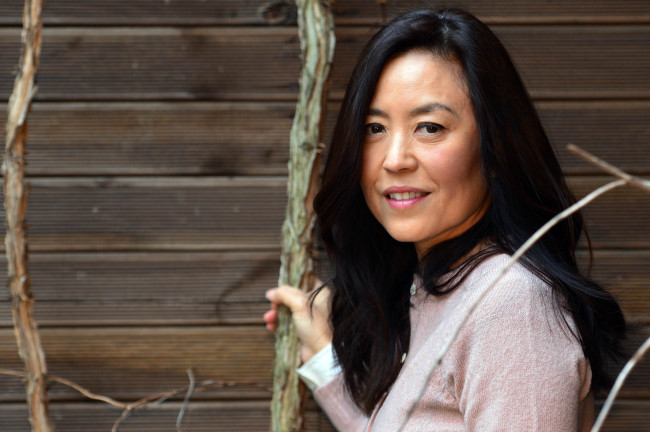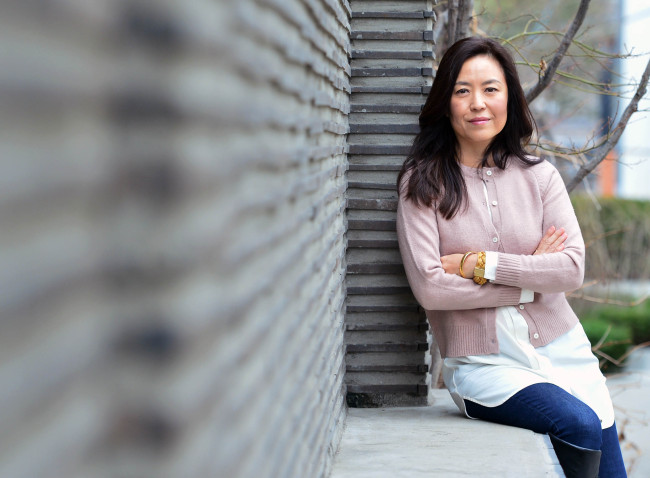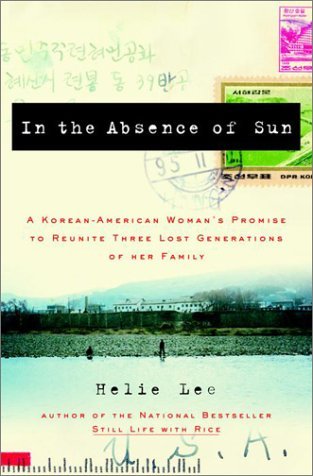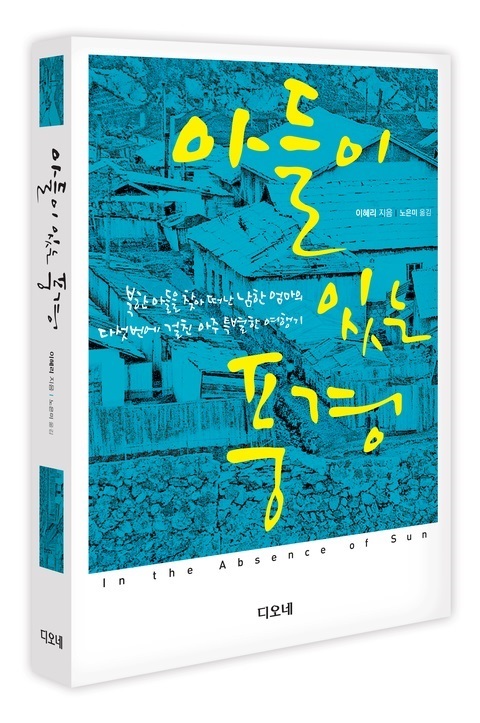[EYE] Grandma’s lifelong prayer answered
Korean-American writer’s account of her family’s escape from North Korea published in Korean
By 두루미Published : March 18, 2016 - 17:02
When Korean-American author Helie Lee wrote her first book, “Still Life with Rice,” she had no inkling that it would endanger the lives of her extended family in North Korea.
Having moved to Canada as a 4-year-old and settled in the U.S. a year later, Lee’s life could have been described as that of the typical “1.5 generation” in the U.S. -- one foot here and the other there, the generation that did not feel completely comfortable in either Korea or the U.S.
“I am (part of the) 1.5 generation, the so-called ‘bridge generation,’” said Lee during an interview with The Korea Herald in Seoul on March 7, adding, “Damaged bridge, really.” The dichotomy -- of living as a Korean-American -- causes a lot of turmoil, she explained.
Having moved to Canada as a 4-year-old and settled in the U.S. a year later, Lee’s life could have been described as that of the typical “1.5 generation” in the U.S. -- one foot here and the other there, the generation that did not feel completely comfortable in either Korea or the U.S.
“I am (part of the) 1.5 generation, the so-called ‘bridge generation,’” said Lee during an interview with The Korea Herald in Seoul on March 7, adding, “Damaged bridge, really.” The dichotomy -- of living as a Korean-American -- causes a lot of turmoil, she explained.

Trying to fit into mainstream America and being chided for being too “Americanized,” she was confused and adrift. “I wanted to find myself. I was completely lost. I felt the need to figure out myself,” Lee said. Twenty years after her family had left Korea in search of the American dream, Lee decided to return to the place that her parents and her grandmother loved -- Korea.
The trip was an eye-opener for Lee. Her distant relatives told her about her “legendary” grandmother -- the small, old lady who fumbled with the TV remote control and microwave, she discovered, was a survivor, a fearless warrior who was a successful opium trader in her younger days living in China as an exile from Japanese colonial rule over Korea, who resisted Communists once she returned to her hometown in today’s North Korea following liberation, and someone who made a valiant escape to South Korea during the Korean War.
Hearing these incredible stories, the stuff of which legends are made, Lee set about putting them down in ink. “Still Life with Rice,” published by in 1996, written from Baek’s perspective, is an account of the sufferings and hardships during the Korean War. “The story was for myself, my family,” said Lee.
As she began writing the book, as if by some divine miracle, her family received a letter from a long-lost relative in North Korea. Forty-one years after Lee’s grandmother, Baek Hong-pyong, was separated from her eldest son, she received a letter from the son’s daughter, telling her that Baek’s son and his family were alive in North Korea. Until then, Baek had had no idea whether her beloved eldest was alive or dead. Then began the family’s efforts to meet the family living in North Korea

In April 1997, Lee, her father and Baek traveled to China, having been told that an arrangement could be made to see Baek’s eldest son. On that trip, Lee and her father “met” the long-lost family across the Yalu River that serves as a border between China and North Korea. It was the time of great famine in North Korea known as the period of the “Arduous March” when as many as 3.5 million people are reported to have died from starvation. Too frail to travel to the border, Baek returned from China without realizing her dream of meeting her eldest son alive.
When Lee arrived in Seoul from the dramatic encounter across the river, she was informed by a “guide” that her book had put her North Korean family at great peril. By giving the real names of the relatives left behind in the book, Lee had unwittingly placed them at risk.
Aghast and feeling responsible for endangering her family, Lee resolved, more than ever, that she had to get the family out of the repressive country. That year, she made a series of trips with the assistance of the guide to smuggle the nine members of her North Korean side of the family out of one of the most repressive countries in the world.
The families finally reunited in Seoul on Dec. 30, 1997. Matriarch Baek’s prayers were finally answered.
With the encouragement of her family to chronicle the experience, Lee decided to write a memoir/novel. “I meditated and prayed on it and let the story happen,” she said. It was not an easy task. It took such a toll on her that after she sent out the finished manuscript, her body broke out in hives. “In the Absence of Sun” was published in 2002 by Harmony Press.

“Not everyone looks great in the book. It was a very stressful time,” she said. “I wanted to be honest. I did not want to look like a heroine. I most certainly was not,” she added.
Her grandmother passed away after signing 20 rushed copies of the book -- she had been growing weaker by the day after reuniting with her son. “In a way, my grandmother steered the project,” Lee said. Right after her grandmother died, Lee received a call from Oprah Winfrey to appear on her iconic talk show. “In the Absence of Sun” was received well in the U.S., where it was noted as the first book on escape from North Korea by an outsider.
The Korean-language edition of the book was released at the end of February, nearly 14 years after the publication of “In the Absence of Sun” in the U.S. “It feels like this is the perfect time. I can present it in a more mature manner,” Lee said, crediting the translator’s tenacity in seeing the project through.

Lee’s experience in helping her family escape North Korea continues to have a profound impact on her. “It has given me such strong backbone,” she said. “Why not?” has been her approach to life since then, staying open to all possibilities.
So much so that she embarked on a project to live like a man for six months and released a documentary, “Macho Like Me,” in 2010. She was out to test the gender experience, and it proved to be a life-changing one.
“I’ve been a cheerleader for girls all my life. Now I see boys are struggling, too,” she said.
The documentary has been adapted into a play and she hopes to bring it to Korean college campuses. “I think people will develop compassion for the other gender,” she said. The play is scheduled to run at the Hollywood Fringe Festival in June. In August, it will play at the Edinburgh Fringe Festival.
Lee has also adapted “In the Absence of Sun” into a play and written another play based on the traditions of shamanism and voodoo that will be staged simultaneously in Chicago and New York.
As for her grandmother’s legacy, Lee said, “She represents Korea to me. I admire her love and respect for the family and her iron-fistedness.”
By Kim Hoo-ran (khooran@heraldcorp.com)



![[AtoZ into Korean mind] Humor in Korea: Navigating the line between what's funny and not](http://res.heraldm.com/phpwas/restmb_idxmake.php?idx=644&simg=/content/image/2024/04/22/20240422050642_0.jpg&u=)


![[Exclusive] Korean military set to ban iPhones over 'security' concerns](http://res.heraldm.com/phpwas/restmb_idxmake.php?idx=644&simg=/content/image/2024/04/23/20240423050599_0.jpg&u=20240423183955)
![[Herald Interview] Why Toss invited hackers to penetrate its system](http://res.heraldm.com/phpwas/restmb_idxmake.php?idx=644&simg=/content/image/2024/04/22/20240422050569_0.jpg&u=20240422150649)
![[Graphic News] 77% of young Koreans still financially dependent](http://res.heraldm.com/phpwas/restmb_idxmake.php?idx=644&simg=/content/image/2024/04/22/20240422050762_0.gif&u=)






![[Exclusive] Korean military to ban iPhones over security issues](http://res.heraldm.com/phpwas/restmb_idxmake.php?idx=652&simg=/content/image/2024/04/23/20240423050599_0.jpg&u=20240423183955)



![[Today’s K-pop] Ateez confirms US tour details](http://res.heraldm.com/phpwas/restmb_idxmake.php?idx=642&simg=/content/image/2024/04/23/20240423050700_0.jpg&u=)